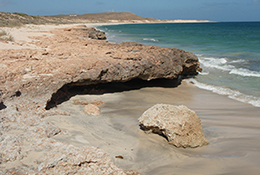Sea levels may rise much higher than previously thought, according to scientists from The Australian National University, who have used fossil corals to understand how warmer temperatures in the past promoted dramatic melting of polar ice sheets.
Dr Andrea Dutton, formerly of the Research School of Earth Sciences (RSES) in the ANU College of Physical and Mathematical Sciences, teamed up with Professor Kurt Lambeck of the RSES to analyse fossil corals around the world from the last interglacial period, 125,000 years ago.

The last interglacial fossil coral reef
They built an extensive database by compiling age and elevation data of fossil corals that live near the sea surface, and used a model to factor in the physics of how changing masses of ice sheets would affect regional sea level at the various fossil coral sites.
“In this way, we were able to account for the geographic variability in sea level observations from this time period and compute the highest point that average global sea level attained. The observations from the corals confirmed the sea level patterns that we predicted using the geophysical model,” she said.
They concluded that sea level during the last interglacial period peaked at 5.5 to 9 metres above present sea level.
“Sea level change – in the past, present, and future – is geographically variable and we must consider this variability to infer what the average global sea level was doing in the past. We observed 5.5 to 9 metres of sea level rise. To explain that, polar ice sheets must have melted: part of Greenland, most of the West Antarctic ice sheet, and perhaps some of the East Antarctic ice sheet. Our findings have important implications for future sea levels,” Dr Dutton said.
“For the period we studied, the poles were probably only 3 to 5 degrees warmer than present. That amount of polar warming is well within what we are predicted to reach this century. This implies that the polar ice sheets may be very sensitive to small increases in temperature.
“This magnitude of sea level rise – up to 9 metres – is obviously not going to happen overnight. But it could happen within a few centuries, so it is important to consider the long-term commitment we make in terms of total sea level rise when we talk about various targets and emission scenarios.
“Given the modest difference in temperature between our present climate and that of the last interglacial period, it is time to start thinking about the legacy we will leave for future generations with the choices we make today.”
The research is published in Science. A copy of the paper is available from the ANU media office.
Dr Andrea Dutton is currently based at University of Florida. The research was carried out at ANU, University of Florida and École Normale Supérieure in Paris.
 July 16th, 2012
July 16th, 2012  riffin
riffin  July 16th, 2012
July 16th, 2012  riffin
riffin